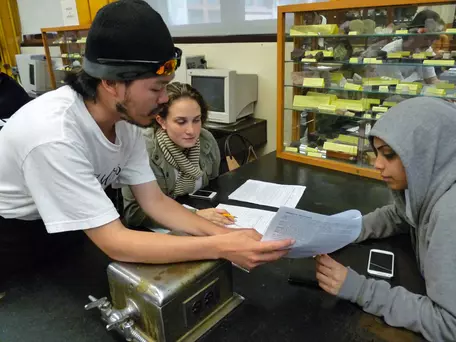Initial Publication Date: September 20, 2018
Support Students through to Graduation
There are many interconnected aspects to supporting students through STEM programs from admission all the way to attaining their degree. Critical support may come from interactions in the classroom, in co-curricular activities, or as part of student support services outside of academics. In addition, since no two students are alike, the mix of support structures that each will need are different as well. It is important to have a constellation or web of supports available to meet the varying needs of the students who will enter your courses and programs.
Assist with Funding

×
Build a Sense of Community

×
- Models and information about infusing sense of community into programs: InTeGrate, LSAMP IINSPIRE, NAGT Traveling Workshops Program (TWP)
- Professional development for faculty to understand their own cultural viewpoint and biases: InTeGrate
- Adaptations for courses and programs to make them welcoming to students with disabilities: SAGE 2YC, International Association for Geoscience Diversity (IAGD) ↗)
- Information about how to use validation and mitigate stereotype threat and solo status: SAGE 2YC
Partner with Community Colleges

×
- Create and strengthen pathways from high school, through two-year colleges (2YCs) to four-year institutions: EarthConnections, InTeGrate
- Advice for how to support students during the transfer process: SAGE 2YC
Prioritize Advising and Mentoring

×
- Models of good advising and mentoring: InTeGrate, SAGE 2YC, LSAMP IINSPIRE
- Advice for students on how to discuss their academic goals with their families: Institute for Broadening Participation (IBP) ↗
Provide Academic Supports

×
- Support strategies for particular groups of students such as first-generation college students, English language learners, and students with disabilities: SAGE 2YC, IAGD ↗
- Active learning strategies that support all students' success: Pedagogy in Action
- Just in time math tutorials in the context of geoscience principles: The Math You Need When You Need It
Facilitate Real-World Experiences

×
- Advice for providing undergraduate research experiences in several contexts: Pedagogy in Action, SAGE 2YC, CUREnet, LSAMP IINSPIRE
- Guidance for integrating research into teaching practice: On the Cutting Edge
- Developing students' science identity: SAGE 2YC
- How to talk to family about the benefits of extracurricular research experiences: IBP ↗
Teach Students How to Learn

×
- Development of self-regulated learners: SAGE 2YC
- Guidance for the use of metacognitive and affective strategies to increase student learning and motivation: On the Cutting Edge
Foster Interdisciplinary Learning

×
- Use of real-world issues like sustainability and social justice to explore interdisciplinary ideas: InTeGrate, Sustainability Improves Student Learning (SISL), BSGD, GETSI, On the Cutting Edge
- Development of videos and public outreach media associated with climate change education: Climate Education in an Age of Media
Develop a Supportive Departmental Culture

×